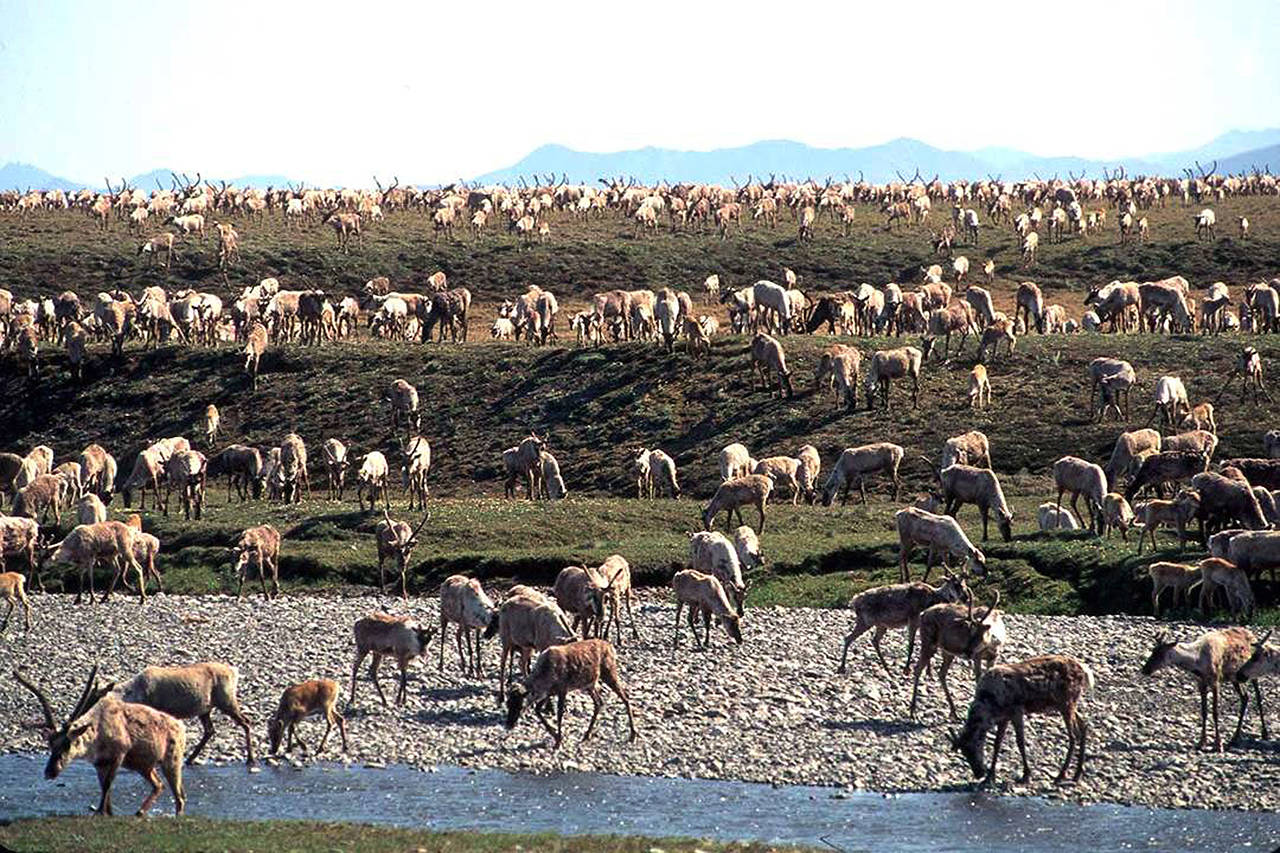By Dan Joling
Associated Press
ANCHORAGE, Alaska — Sometime next April, pregnant cows in the Porcupine Caribou Herd in Canada will take the lead in an annual migration of nearly 200,000 animals north to Alaska.
From winter grounds in Canada’s Yukon Territory, the caribou traveling in small and large groups will cross rivers and gaps in the mighty Brooks Range on the 400-mile journey. Their destination is the coastal plain of the Arctic National Wildlife Refuge, a strip of flat tundra between the mountains and Arctic Ocean.
The plain provides food and a vantage point from which caribou can spot predators from far away. But beneath the lichens and cotton grass, there’s a hidden resource: crude oil.
Opening the coastal plain to petroleum drilling, with the hope for jobs and new oil for the trans-Alaska pipeline, has stood as a goal of every Alaska governor and the state’s members of Congress for three decades. And the opportunity is rising again in federal budget discussions.
Congressional Republicans are pushing for refuge drilling with a projected $1 billion from lease sales to help pay for President Donald Trump’s proposed tax cut. The Senate Energy and Natural Resources Committee on Wednesday advanced the drilling measure. Chairwoman Lisa Murkowski, a Republican U.S. senator, says oil production later would bring in much more revenue.
For three decades, environmental groups have fought opening oil development on the plain —home to musk oxen and polar bear dens.
“What this bill would do is turn America’s last great wilderness into a lost wilderness,” said Adam Kolton, executive director of the Alaska Wilderness League.
The refuge begins at the Arctic Ocean with salt marshes, barrier islands and beaches and transitions to the treeless coastal plain. About 25 miles from the ocean, the Brooks Range rises, providing spectacular vistas and habitat for Dall sheep, wolves and grizzlies.
The Arctic National Wildlife Refuge was created in 1960 during President Dwight Eisenhower’s administration. Congress in 1980 expanded the refuge to nearly the size of South Carolina with the provision that 2,300 square miles of the coastal plain be studied for natural resources.
The U.S. Geological Survey estimates the plain holds 10.4 billion barrels of oil, which Murkowski calls North America’s greatest prospect for conventional petroleum production.
Murkowski has promoted legislation limiting drill pads and other infrastructure to 2,000 acres. But, while exploratory wells could be drilled only when caribou are not present, production would bring a web of drill pads connected by roads and pipelines.
Matthew Rexford grew up in the Inupiat Eskimo village of Kaktovik on a Beaufort Sea barrier island, the only village within the refuge. His people for centuries have survived on caribou, fish and bowhead whales, he said, but were brought out of starvation and third-world conditions by oil development at nearby Prudhoe Bay.
Tax revenue to the local borough, Alaska’s equivalent of a county, provided money for schools, clinics and amenities taken for granted elsewhere such as indoor plumbing. Rexford supports drilling in portions of the coastal plain.
“Further development would assure our community and region with a viable economic base to provide further governmental services to our residents,” he said.
Rexford is president of Kaktovik Inupiat Corp., a village corporation whose subsidiaries likely would bid on oil field work. Drilling, he said, can be done without harming caribou.
But Sam Alexander, representing Gwich’in Indian villages south of the refuge, takes the opposite view. The cultural identify of his villagers is tied up in the harvest of caribou, and they fear drilling’s effects on migration paths and birthing grounds.
The Gwich’in have been derided for resisting progress, he told Murkowski’s committee Nov. 2, but no amount of money earned in oil field jobs can replicate the Gwich’in healthy, traditional subsistence diet.
“Tell me how replacing caribou with highly processed food is going to be better for us,” he said. “We’d be looking at a steady diet of Spam, macaroni and cheese and other shelf-stable delicacies often at four to five times the price of what you would find in the Lower 48.”
Sandy Silver, Yukon Territory premier, says politicians of all stripes in the territory want the coastal plain kept as wilderness.
“It is … sacred calving ground for the Porcupine Caribou,” he said by phone from Whitehorse.
The herd, named for the Porcupine River, has grown to nearly 200,000 caribou, up from an estimated 170,000 in 2010, he said, noting it’s one of the only caribou populations increasing in North America.
The GOP budget projects $1.1 billion in revenue from drilling leases over 10 years. With oil production, substantially greater revenue will flow to the federal government from royalties and federal income taxes, according to Murkowski.
Critics call that overly optimistic. But drilling fits Donald Trump’s call for America to be not only “energy independent” but “energy dominant,” using coal, nuclear power, and untapped petroleum, especially on federal lands.
Author Debbie Miller was introduced to the refuge while teaching in the Gwich’in community of Arctic Village in the 1980s. She camped with her family in the refuge, witnessed thousands of caribou crossing the Canning River, wrote about her experience in books and testified in Congress that oil rigs don’t belong there.
She scoffs at the idea that $1 billion earned from lease sales, or even future royalty earnings, will play a significant role in the country’s trillion-dollar financial issues.
“You don’t try balance your budget by opening up a wildlife refuge or a national park,” she said.
Talk to us
> Give us your news tips.
> Send us a letter to the editor.
> More Herald contact information.

























